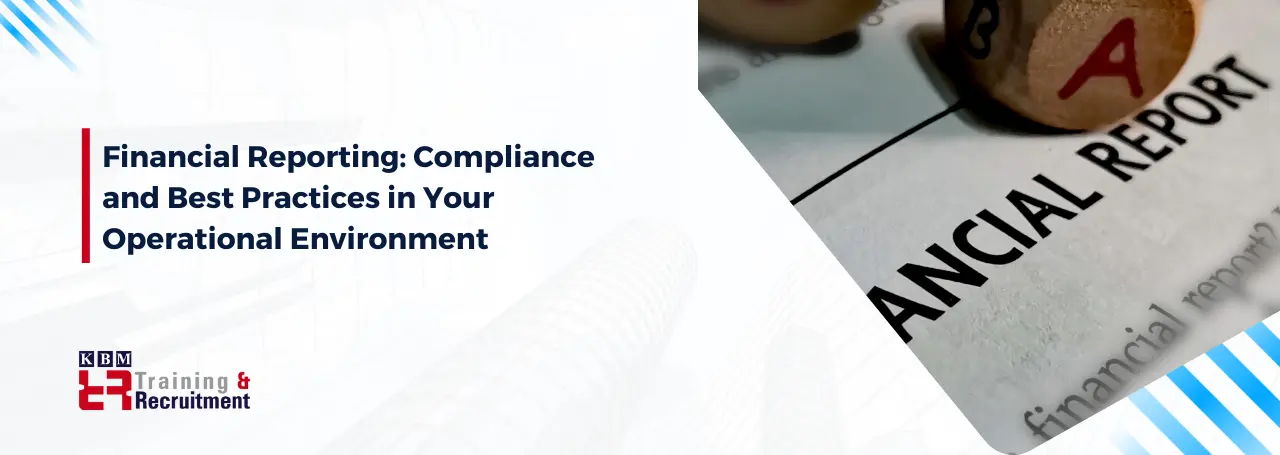In the fast-paced and intricate world of finance, accurate financial reporting is a cornerstone of organisational success. Not only does it provide stakeholders with a comprehensive view of a company's financial health, but it also ensures compliance with regulatory standards.
In this blog, we'll delve into the critical aspects of financial reporting, exploring the importance of compliance and highlighting best practices tailored to your operational environment.
Transparency and Stakeholder Confidence
Financial reporting is how organisations communicate their financial performance to stakeholders, including investors, regulators, and internal management. Transparent and accurate reporting instils confidence in stakeholders, fostering trust and credibility.
Informed Decision-Making
Financial reports serve as vital tools for informed decision-making. Executives and managers rely on these reports to assess the organisation's financial health, identify improvement areas, and make strategic decisions that lead the business forward.
Regulatory Compliance
Adherence to regulatory standards is a non-negotiable aspect of financial reporting. Governments and regulatory bodies impose specific guidelines and frameworks to ensure consistency and transparency in financial reporting, emphasising the importance of compliance.
Compliance in Financial Reporting
IFRS and GAAP are two prominent frameworks that guide financial reporting globally. IFRS is widely used internationally, while GAAP is predominant in the United States. Understanding the specific framework applicable to your operational environment is crucial for compliance.
Sarbanes-Oxley Act (SOX)
Compliance with the Sarbanes-Oxley Act (SOX) is essential for organisations operating in the United States. SOX aims to safeguard investors and uphold the accuracy and reliability of financial information by setting strict internal control standards.
Industry-Specific Regulations
Specific industries may have unique reporting requirements mandated by regulatory bodies particular to that sector. Organisations must stay abreast of industry-specific regulations to maintain compliance and avoid legal repercussions.
Clear and Concise Presentation
Financial reports should be presented clearly and concisely. Avoiding unnecessary jargon and offering explanations for complex terms is crucial. Visual aids, including charts and graphs, can enhance understanding for stakeholders with diverse financial expertise.
Consistency Across Periods
Consistency is vital in financial reporting. Ensure that accounting methods, reporting formats, and terminology remain consistent across reporting periods. This consistency enables stakeholders to make meaningful comparisons and track financial performance over time.
Timeliness and Regularity
Timely reporting is critical for maintaining stakeholder trust. Establish a regular reporting schedule and adhere to it consistently. This practice demonstrates organisational discipline and provides stakeholders with up-to-date information for decision-making.
Detailed Footnotes and Disclosures
Accompanying footnotes and disclosures offer additional context to the financial statements. They provide explanations for accounting policies, assumptions, and potential risks. Detailed disclosures contribute to a more comprehensive understanding of the economic picture.
Internal Controls and Audits
Institute robust internal controls to guarantee the accuracy and reliability of financial reporting. Conducting regular internal audits aids in identifying weaknesses in controls, providing an opportunity to rectify issues before external audits or regulatory reviews occur.
Technology Integration
Leverage technology for efficient and accurate financial reporting. Advanced accounting software can streamline the reporting process, reduce the error risk and enhance data accuracy. Integration with other business systems promotes data consistency.
Stakeholder Engagement
Engage with stakeholders to understand their specific information needs. Tailor financial reports to address the concerns and priorities of different stakeholders, fostering a collaborative and transparent relationship.
Small and Medium Enterprises (SMEs)
For SMEs, simplicity is vital. Implementing user-friendly accounting software, focusing on key performance indicators (KPIs), and seeking professional advice for compliance can ensure effective financial reporting without overwhelming resources.
Multinational Corporations
Multinational corporations operating across diverse jurisdictions must navigate the complexities of different regulatory frameworks. Standardising financial reporting processes globally while accommodating local variations is crucial for consistency and compliance.
Publicly Traded Companies
Publicly traded companies face heightened scrutiny. In addition to adhering to SOX requirements, maintaining open communication with investors, promptly addressing concerns, and proactively disclosing relevant information contribute to investor confidence.
Nonprofit Organisations
Nonprofit organisations must adhere to specific accounting standards tailored to their sector. Transparent reporting on the allocation of funds, program outcomes, and compliance with grant requirements is essential for maintaining donor trust.
Integrated Reporting
Integrated financial reporting goes beyond traditional financial reporting by considering non-financial information, such as environmental, social, and governance (ESG) factors. This holistic approach gives stakeholders a more comprehensive view of an organisation's performance.
Blockchain Technology
Blockchain's decentralised and transparent nature promises to enhance the security and integrity of financial reporting. The immutability of blockchain records reduces the risk of fraud and improves the reliability of reported financial information.
Artificial Intelligence (AI) and Automation
AI and automation technologies streamline financial reporting processes by automating routine tasks, data analysis, and report generation. This not only increases efficiency but also reduces the likelihood of human error.
Conclusion
In conclusion, financial reporting is not just a regulatory obligation; it's a strategic tool that can drive organisational success. By prioritising compliance with relevant frameworks, embracing best practices, and tailoring strategies to your operational environment, you can examine the quality and impact of financial reporting in your organisation.
As technology continues to advance and reporting standards evolve, staying proactive and informed about emerging trends will help your organisation at the forefront of financial reporting excellence. Ultimately, a commitment to transparency, accuracy, and stakeholder engagement will meet regulatory requirements and contribute to your organisation's sustained growth and success.






















